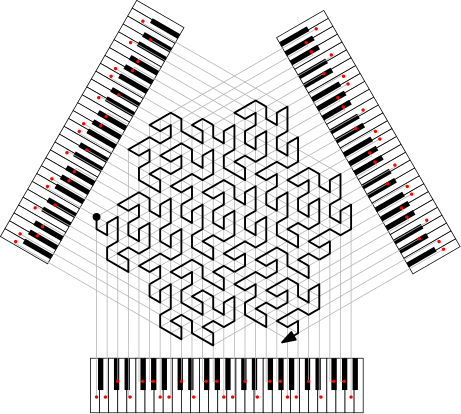Table of Contents
Herman Haverkort > Recursive tilings and space-filling curves > Sound of space-filling curves > Sound of space-filling curves I > Location mapping
The sound of space-filling curves by location mapping: additional examples
I am exploring different approaches to make sonifications or music of space-filling curves. This page contains a number of sound tracks of space-filling curves, mapped to sound using location mapping. For an introduction into space-filling curves mapped to sound using location mapping or other techniques, please check out the main page first. Below, I provide some additional examples that may be interesting, although probably less successful than those on the main page. In particular:
- Sonifications of three-dimensional curves;
- A sonification of the Gosper flowsnake curve based on cubic coordinates;
- Continuous-pitch sonifications (warning: not music, I guess);
Gosper flowsnake curve
Using cubic coordinates, we can also make a sound track of a curve that is drawn on a triangular grid, using three voices. Here is the raw material of a first attempt at the Gosper “flowsnake” curve. Theory suggests that two-dimensional curves may be boring—personally I believe that the sound tracks on the main page show that this is not always true. For the Gosper curve, I am undecided. Maybe this curve has musical potential, maybe not.
Three-dimensional
Below are three different three-dimensional Hilbert curves as described in my article (“raw” material, 4096 sample points in 14 minutes, ending abruptly). These tracks are unpolished (and probably too long), but it may be interesting to check out the rhythms.
| curve name | nickname | audio |
|---|---|---|
| Cl00.cf.ff.dd | (unnamed) | |
| Ca00.gs | Beta | |
| Se33.c7T | Mosquito |
Cl00.cf.ff.dd is a so-called standing curve: the similarity transformations between the curves within the octants and the curve as a whole keep the vertical axis vertical. This is clearly audible: two voices (the horizontal axes) imitate each other's rhythms, while the other voice (the vertical axis) has a (slow) rhythm of its own.
The Beta curve is hyperorthogonal, which implies that no note in any voice is shorter than 2 time units.
Continuous pitch
Below are some examples of continuous-pitch renderings, 6 minutes each. This is unlike anything else on this page: there are no notes, the sonification is really a continuous mapping from time to pairs of pitch values. So, in a way, you could say that this is what space-filling curves really sound like:
Note: the first of these is a space-filling traversal, but not a space-filling curve, since it is not continuous.



